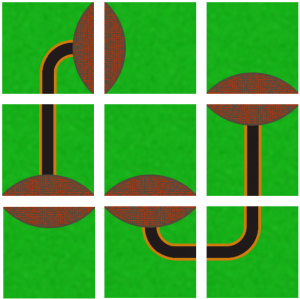Pyweek 2011 – citySquare
This year I entered into pyweek. Pyweek is a python game programming competition where the competitors are given a theme and have a week to make a game on it. The theme that was voted in this time was "Nine Times" I wasn't really sure what I could do with this theme, and as a result my game is only very loosely linked to the theme.
The game that i came up with is a simple puzzle game where one must lay tiles within a grid to earn points. It plays out a bit of a mildly irritating single player version of Carcassonne. However I was reasonably happy with the game that i ended up with after a week of development.
I was also happy enough with the quality of the game that produced to use it as part of a project in the software design and development course that I am currently doing at school, for this I added a little bit more polish to the menus and gameplay and ironed out its few bugs. My teacher was luckily very impressed by the game and I ended up scoring full marks for the assignment (the game + a ton of documentation)
If after reading though all of that you would still like to play the game there download links and further instructions below
Downloads
The latest version of the game can be downloaded from github HERE
Objectives
The key objective to citySquare is to arrange all of the tiles in the right-hand tray on the grid to the left. The tiles that you have to match are comprised of three different types of terrain: roads, cities and plain old grass.
Controls
A tile can be picked up and put down by left clicking. While being held you can either right click or scroll to rotate the tile. The arrow keys can be used to shift all of the tiles around the grid and you can hold tab to view a breakdown of your score.
To return to the menus from gameplay simply press escape, while on menus you can also toggle full screen mode by pressing F4
Rules
Tiles must be placed so that the edges of each square match up with the squares around it. The entire edge of the grid should be grass and have NO roads or cities touching it.
Scoring
Points are scored based on completed roads and cities, however cities are scored in a way that will reward you for building larger cities. For example one city made up of four tiles would be worth much more than two cities made up of two tiles.
